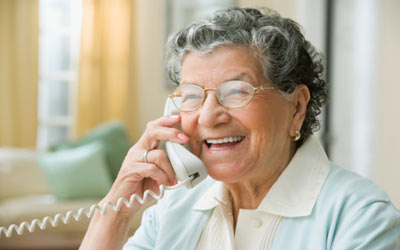Whether you live two miles or 2,000 miles away from your aging parents, you might worry about whether they are safe and sound. Thanks to the development of technological devices, remote monitoring can give you and your older parents peace of mind. Of course, this arrangement should only happen with the agreement and consent of your parents. Here are some tips on how to make sure your aging parents are safe and secure from a distance.
Starting decades ago, with the “I’ve fallen and I can’t get up” devices, savvy companies have been designing and making products that cater to the legitimate concerns of seniors and their loved ones about needing help, when no one is around to render assistance. The explosion of tech-related gadgets now includes such things as:
- GPS sensors your parents can wear in a slipper or shoe, or as a bracelet or pendant. These devices let you know when your parent has gone outside at night (or during the day) or walked beyond a particular location. For example, if your parent has Alzheimer’s disease, he might wander at night. You can get an alert through your computer or cell phone. Once you set up the monitoring system, you can set boundaries for daytime and nighttime activity alerts.
- Video doorbells and security cameras can let you know when someone comes up to your parent’s front door or approaches the house or garage, wherever you have the cameras. You can also get motion-activated cameras to notify you, if someone gets into your parent’s house at night or your parent is up walking around. You can have a two-way conversation with a live video feed, which can be a lifesaver, if your parent needs help.
- Other sensors can let you know if your parent turned on the stove and walked away, left the refrigerator open, left any door in the house open and took her medicine on schedule.
These devices can sound a little creepy, if used inappropriately. You should have a candid discussion with your parents about the point at which monitoring would feel intrusive. For example, even though many falls in the home happen in the bathroom, particularly the shower, you do not want to install video cameras there.
You might want to start with something basic, like a video doorbell. Once your parent is used to the device and feels comfortable with the technology, you can slowly expand to meet your parent’s safety needs. You should make sure your parent understands the purpose is not for you to take away his independence or exercise control over him, but rather, to keep him safe.
There are limits to what these devices can do, so you do not want to place too much reliance on them. Nothing will replace the human touch. You should continue to make phone calls to your parents and have actual conversations. You should also verify that the devices are still working after installation. A clever senior can easily disable a device, if she objects to its presence. Making sure that everyone involved is on the same page can be tricky, but it’s worth the time. It’s the same advice that I give to clients about the more traditional aspects of estate planning, as well as managing tricky family dynamics.
I am always open to conversations about handling these tricky family situations and can recommend remote monitoring that other clients may have found helpful.
References:
AARP “Remote Monitoring to Keep Older Adults Independent and Safe.” (accessed May 30, 2019) https://www.aarp.org/caregiving/home-care/info-2018/technology-helps-remote-monitoring.html



